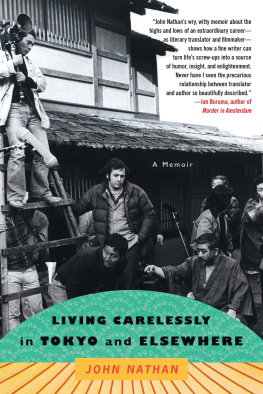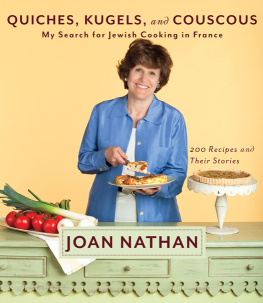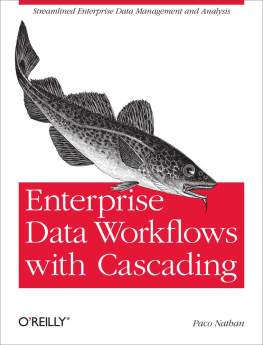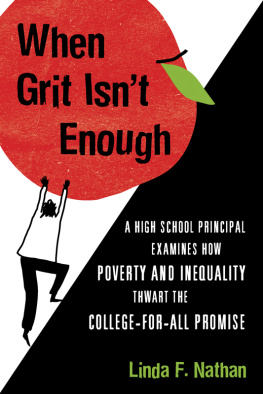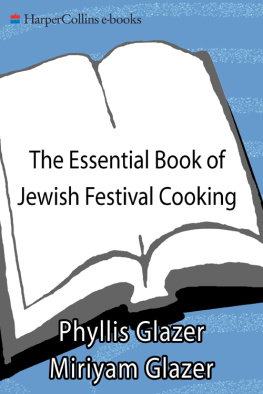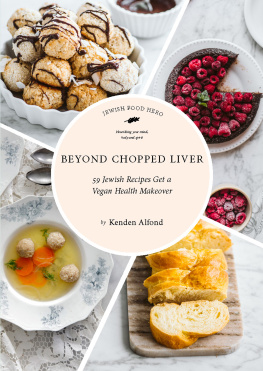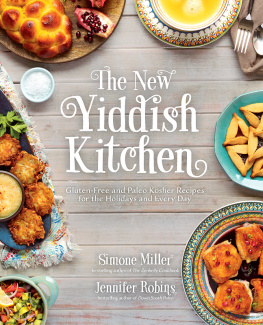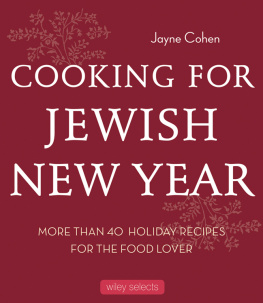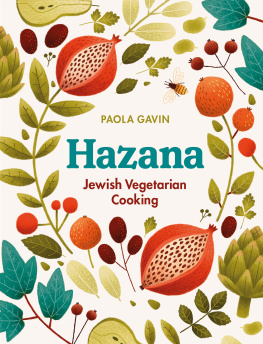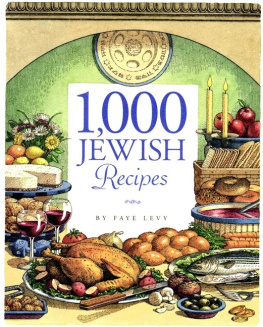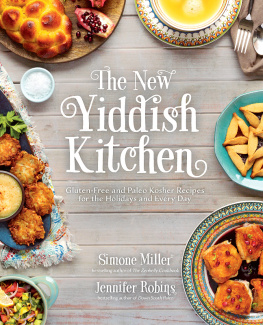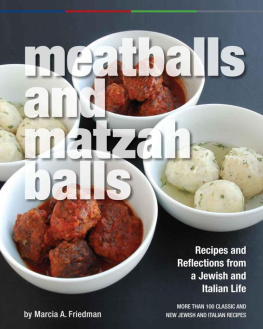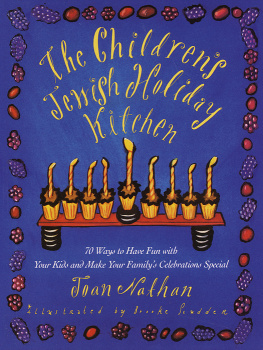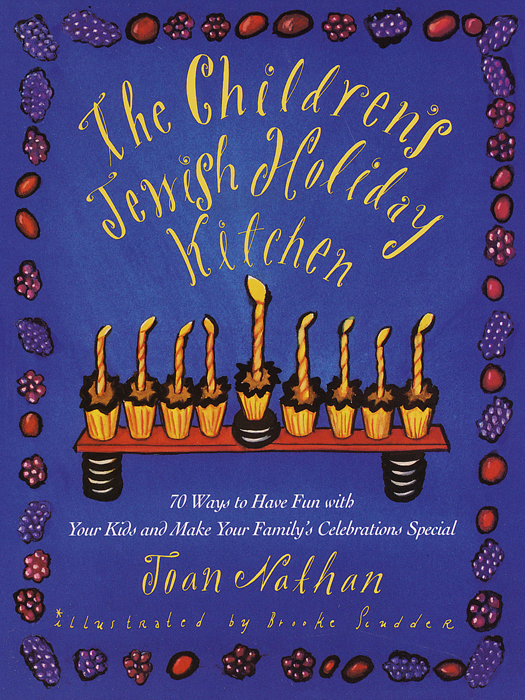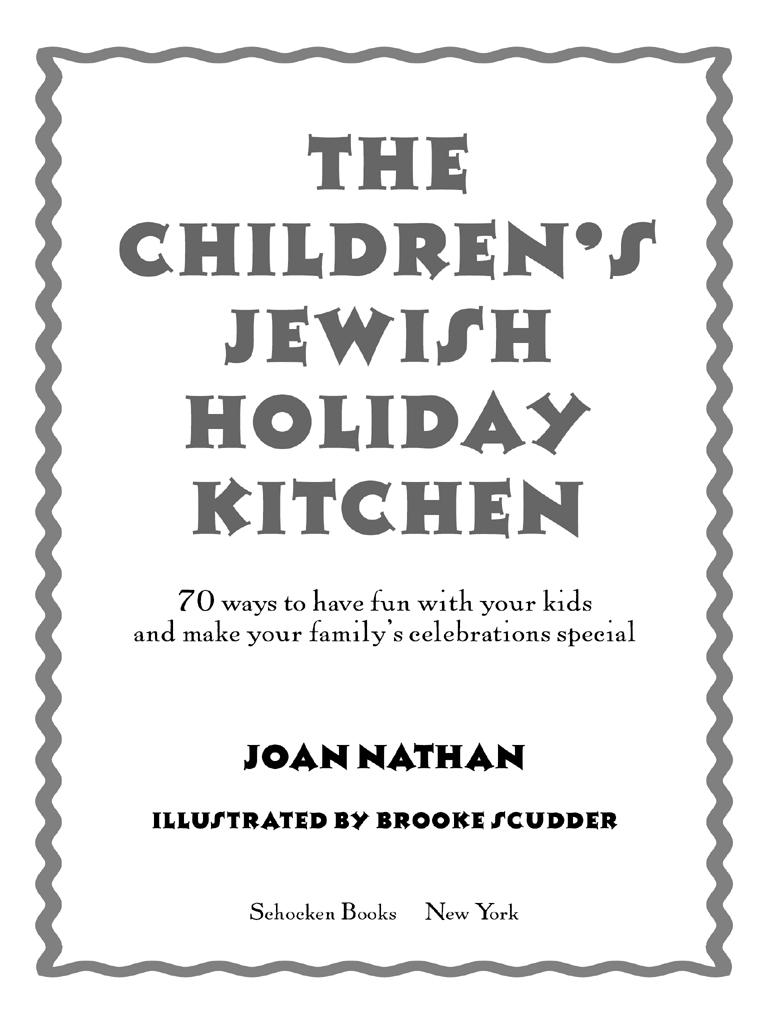Copyright 1987, 1995 by Joan Nathan
Illustrations copyright 1995 by Brooke Scudder All rights reserved under International and Pan-American Copyright Conventions. Published in the United States by Schocken Books, New York, and simultaneously in Canada by Random House of Canada Limited, Toronto. Distributed by Pantheon Books, a division of Random House, Inc., New York. Originally published in hardcover by Schocken Books in 1995. SCHOCKEN and colophon are registered trademarks of Random House, Inc. xii, which includes a sampling of the over 200 symbols used by kosher certifying agencies. xii, which includes a sampling of the over 200 symbols used by kosher certifying agencies.
The collage was produced by Kashrus magazine, P.O. Box 204, Brooklyn, NY 11204, which monitors all kosher certifications. Reprinted by permission. Library of Congress Cataloging-in-Publication Data
Nathan, Joan.
The childrens Jewish holiday kitchen: 70 ways to have fun with your kids and make your familys celebrations special / Joan Nathan.
p. cm.
Includes index.
eISBN: 978-0-307-77784-3
1. 2. 2.
Holiday cookery
Juvenile literature. [1. Cookery, Jewish.] I. Title.
TX724.N367 1995
641.5'676dc20 95-5981
AC www.schocken.com v3.1
BOOKS BY JOAN NATHAN
The Foods of Israel Today Jewish Cooking in America The Jewish Holiday Baker The Jewish Holiday Kitchen The Children s Jewish Holiday Kitchen An American Folklife Cookbook The Flavor of Jerusalem (with Judy Stacey Goldman) To Daniela, Merissa, and David
ACKNOWLEDGMENTS

Writing a cookbook always involves the help of many people. I would like to thank the following friends and family for expert advice, ideas, and recipes: Susan Barocas, Beverly I. Colman, Mickey Feinberg, Paula Gerson, Ellen Gold, Mary Lynn Goldstein, Anne Kampelman, Reba Leand, the late Rabbi Eugene Lipman, Charlotte Muchnick, Ellen Neschis, Dorothy Regen-steiner, Cantor Arnold Saltzman, Marian Sofaer, Mark Talisman, Elizabeth Wallace, and Barbara Winnik.
I would also like to thank Adas Israels Gan Ha-Yeled and Jewish Primary Day School for introducing my children to so many Jewish customs.
CONTENTS

PREFACE

Since the first edition of this book was published in 1987, I have watched my children grow. My eldest daughter, Daniela, is off to college next year, while Merissa just celebrated her Bat Mitzvah. Their brother, David, an infant in 1987, is now an aspiring young actor. Amidst the ever-changing kaleidoscope of their lives at homc- and at school, the table has been a constant in binding us together as a family. We continue to try to make time each evening for a meal together, a refreshing pause when we can catch up with each of our children, and they with us! And how relaxing it is to talk while snipping beans or shelling peas.
This book is a testimony to that time together. It includes twenty new recipes which we as a family use and have developed. Also over the years, as we have traveled, we have learned many things and acquired new tastes. Many of these are shared in this new edition, like snacking on pomegranates and using prepared puff pastry to make knishes. As our children have grown they have become less interested in meat, and more in vegetarian meals with low fat content. And they have definite ideas of what they like.
As David told me when I was preparing this new edition of the book, Mom, kids like plain lasagna, no lumps in their food. They like smooth tomato sauce! I could have added for him that they also like every dessert with chocolate chips. Through the years as I travel the country speaking about Jewish food, I have been gratified to discover how many children have learned to cook from these recipes. Now my daughters and their friends can use this book on their own. Luckily for me, David still needs my help! Shabbat and the Jewish holidays have always remained special times for us. My husband, Allan, and I, my children, family, and friends have created so many wonderful memories, not just of the holiday observances themselves, but of the preparations as well.
Because of the symbolic dishes associated with Judaism, food is a perfect vehicle to introduce children to the many aspects of their religion. They will feel good about helping to prepare the holiday and Sabbath meals. Just remember: a meal doesnt have to be heavy to be Jewish! The aims of this book are the same as they were when it was first published: simply to have fun making Jewish holiday recipes that the whole family can enjoy; to teach children some of the basics of cooking and baking; and, in the process, to explore and explain the meaning and history behind Jewish food. The premise is that cooking will be a cooperative effort between adults and children. The Childrens Jewish Holiday Kitchen is divided into ten holidays, with menus and recipes for each. As I have discovered from going through these celebrations with my children, meaning and memories are greatly enhanced when we all participate together in the preparations.
All of the recipes specify the ingredients, equipment, and steps suitable for children to do by themselves or with adults or older children. The adult will assign tasks to match the skill of the cooks. Starred (*) menu items are dishes for which recipes are given. Cooking skills such as separating eggs, using knives, rolling out piecrust, blanching almonds, and proofing yeast are explained in the course of the recipes. Learning these basic skills will serve your children well throughout all their days in the kitchen. The foods are those that children and adults alike will enjoy, and use only wholesome ingredients.
We have used real Jewish holiday recipes, some of which have been simplified for children but still satisfy adult taste buds. We have shared the culinary traditions we especially like in our family, omitting those that are not child-centered. The recipes represent a sampling from Israel and many of the countries in the Jewish Diaspora. Many include stories, some about the way grandparents and other ancestors, going back through Europe and the Orient to ancient Palestine, may have served the food on their own tables. Still others, like the cupcake menorah for Hanukkah or the matzah pizza, are American. In addition to the recipes themselves, The Childrens Jewish Holiday Kitchen shows how a family can celebrate the holidays and enjoy craft activities such as making hallah covers and candlesticks, and includes hints for introducing children to the Torah portion of the week.
Tips for making hallahs for large or small families are also given. One last word to the wise parent or older child should be sufficient: before you begin cooking, fill your sink with warm, sudsy water and bright-colored sponges. Let your children know early on that cleaning up as they go along is part of the activity. Above all, as we worked on this expanded book and the recipes that are part of our weekly ritual, we enjoyed learning even more about the blessings and traditions, cooking with our friends and eating our creations during and after the cooking process was finished. When I first wrote this book my children treated cookie dough like Play-Doh. Now, I am happy to say, they are great start-from-scratch cooks.


